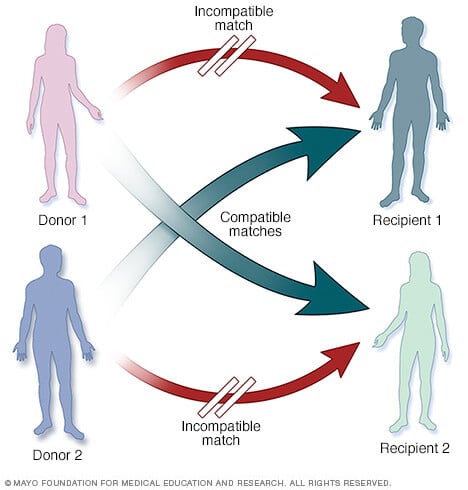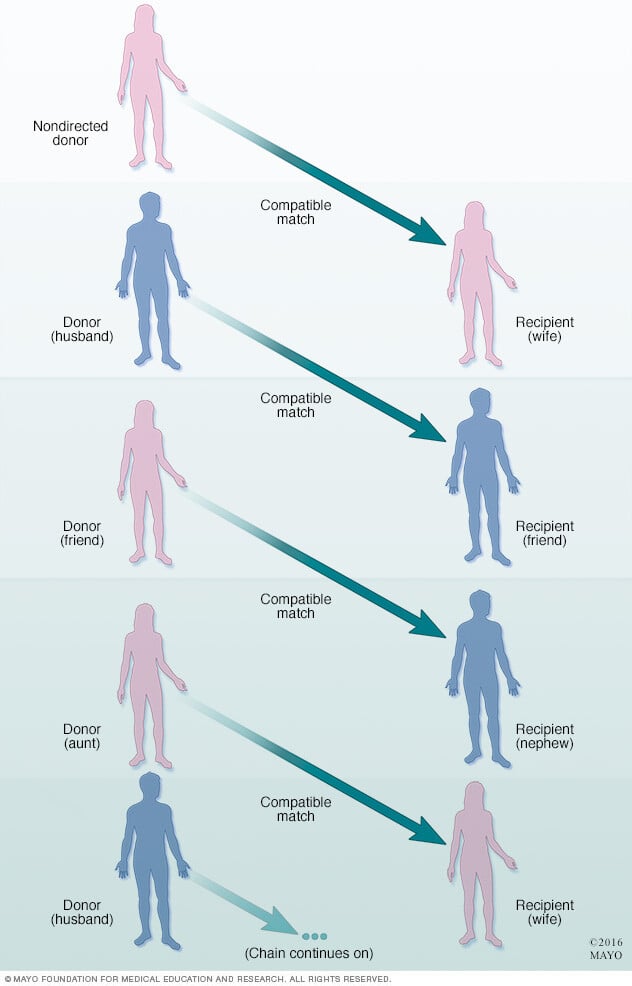Nondirected living-donor transplant
Overview


Nondirected living donors are people who donate organs, usually kidneys, to people they don't know. The organs are given anonymously as gifts without expectation of something in return.
Nondirected donors also are called good Samaritan or altruistic donors. The person receiving a donated organ is called a transplant recipient. A transplant recipient is chosen by organ compatibility and need.
A nondirected living donor also may do paired organ donation or organ donation chains to help more matches happen. This process often creates a chain of transplants with many people benefiting from the nondirected donor's gift.
Why it's done
Nondirected living organ donors have become more important during the last few years. That's because the need for organs is greater than the number of organs available from deceased donors. Nondirected living organ donors fill this need and shorten the wait time for an organ.
Nondirected living organ donors can help many transplants happen by creating more matches to form a donation chain.
Like other types of living-donor organ transplant, nondirected living-donor organ transplant helps save lives. It also has many benefits for the transplant recipient, including:
- Less time spent on a waiting list.
- Fewer health problems before transplant because of the shorter wait.
- Better survival rates after transplant.
Risks
Most living donors make a full recovery. However, organ donation has risks. The risks are different for each person and can be minor or serious. Serious risks can be immediate, short-term or long-term. If you wish to donate an organ, your health care professional can explain your risks.
Immediate risks
Risks that are present during or right after surgery are called immediate risks. Some immediate risks, such as infection, can be fatal. Other possible immediate risks of nondirected living organ donation are:
- Pain.
- Bleeding.
- Blood clots.
- Tissue or organ injury.
- Pneumonia.
Short-term risks
Short-term risks are present within a year or so after surgery. The short-term risks of nondirected living organ donation differ depending on the type of organ you donate. Your transplant team can explain the possible short-term risks of your procedure.
Long-term risks
Long-term risks are present anytime during life. Overall, long-term risks are few for living donors who are healthy. However, not every possible long-term risk is known, and each person's experience is different.
Some possible long-term risks of nondirected living organ donation are organ failure and mental health issues, such as anxiety and depression. You can lower your long-term risks by practicing healthy habits and seeing your transplant team and family healthcare professional for regular checkups.
How you prepare
Becoming a nondirected living donor is an important decision. You should not feel pressured to donate, and you can change your mind at any time.
Together, you and your care team at the transplant center decide whether living donation is right for you. To do this, the care team runs tests to make sure you are healthy enough to donate. They also talk with you about the benefits and risks of organ donation and may ask you about your reasons for donating, your support network and your financial situation.
Making an informed decision
It's important that you learn as much as you can about nondirected living-donor transplant before becoming a donor. Some things you can do are:
- Read as much as you can about your procedure. Knowing what to expect before and after organ donation can help you feel more prepared.
- Talk with your primary healthcare professional. Ask about all the possible risks and benefits of donation. If you have chosen a transplant center, you also can ask your care team to answer questions.
- Join a support group or connect with other living donors. It can be comforting to talk with others who are considering organ donation or who have donated. It also can help you learn what to expect.
Choosing a transplant center
You may choose a transplant center, or your healthcare professional may help you choose one. Your insurance company also may have a list of preferred centers.
When choosing a transplant center, some things to think about are:
- Statistics. Check how many transplants the center does each year, including the number and type of transplant. You also can compare transplant center statistics through the database maintained by the Scientific Registry of Transplant Recipients.
- Survival rates. Consider the transplant center's survival rates for both organ donors and recipients.
- Technology and techniques. These give you information about the center's efforts to innovate and can show if the program is growing.
- Support services. Many transplant centers offer support and resources, such as support groups, travel accommodations, financial resources and lodging for recovery.
What you can expect
For you to become a nondirected living organ donor, your care team at the transplant center looks at your overall health and does some tests to see if you can donate.
Most nondirected living organ donations are for kidneys.
It's also possible to donate part of your liver as a nondirected living organ donor, but this is less common because of the risks involved.
Your surgery is scheduled after you are approved as a donor. Your organ is sent for distribution through the established organ allocation system.
The donated organ is matched with someone needing a transplant. The match is decided based on many factors. Some factors are organ match, personal health and waiting list status.
Sometimes, you can ask to meet the person who received your organ. You also can ask to remain anonymous. The choice is up to you and your transplant center's policy.
Results
After your organ donation, it may take you a few days or weeks to get back to your typical routine. Recovery time can be different for each person, so be sure to have help from friends or family if needed.
You'll also need to schedule follow-up visits with your transplant team after you donate. Regular checkups help you and your healthcare team know how you're healing and whether you're healthy.
Most organ donors are happy with their decision to donate. But sometimes, organ donors may feel sad or regretful. If this happens to you, ask your transplant team for additional resources or support.



